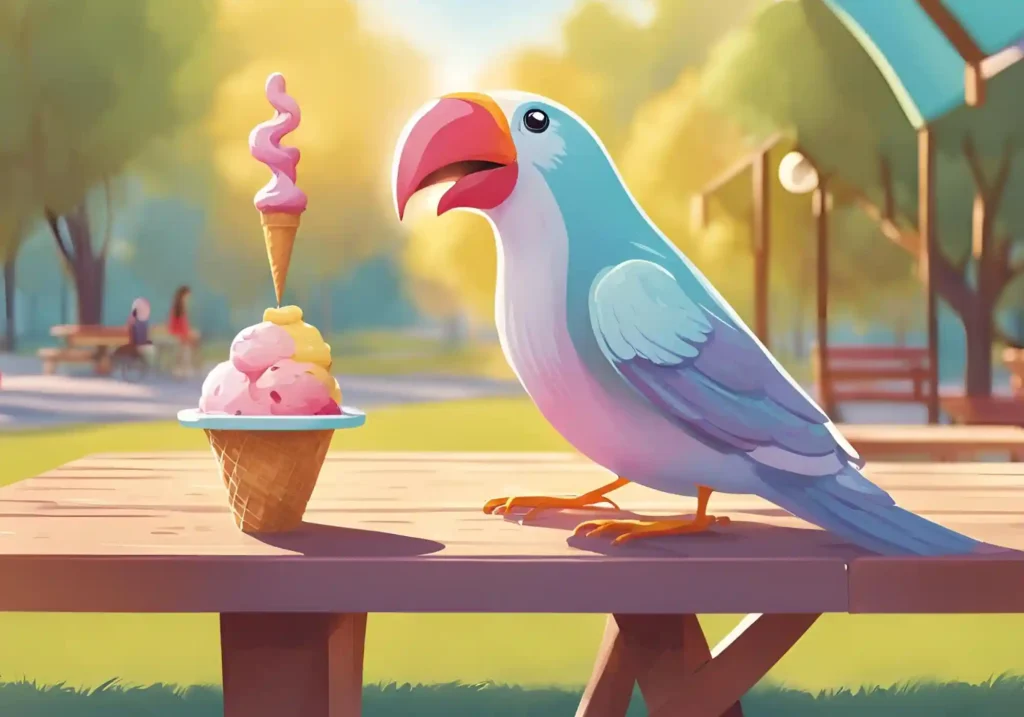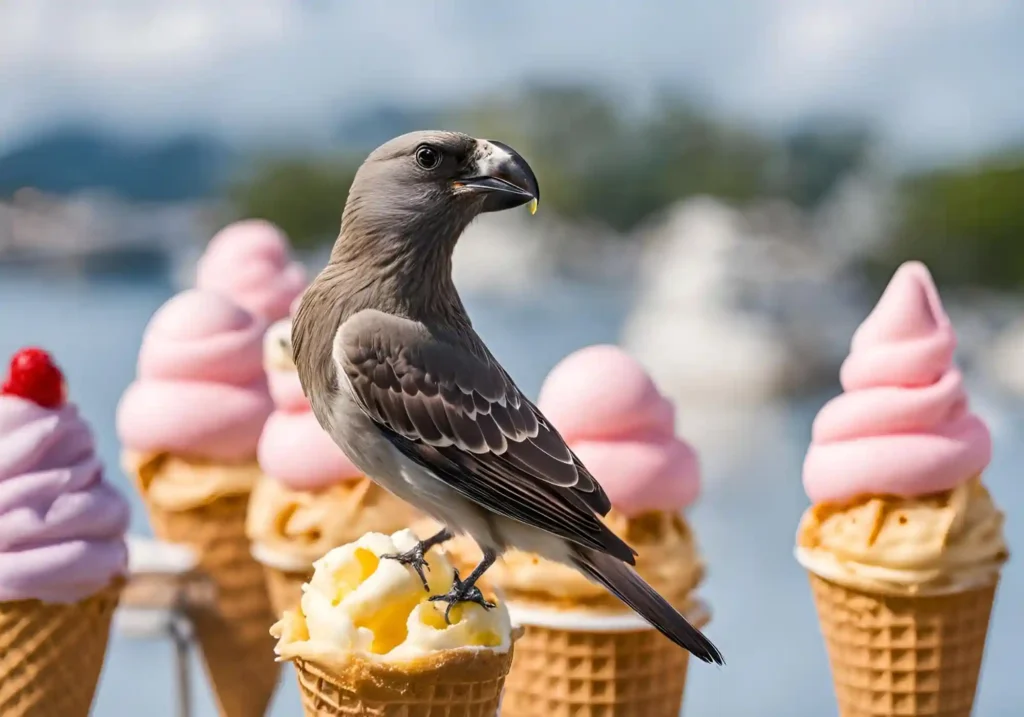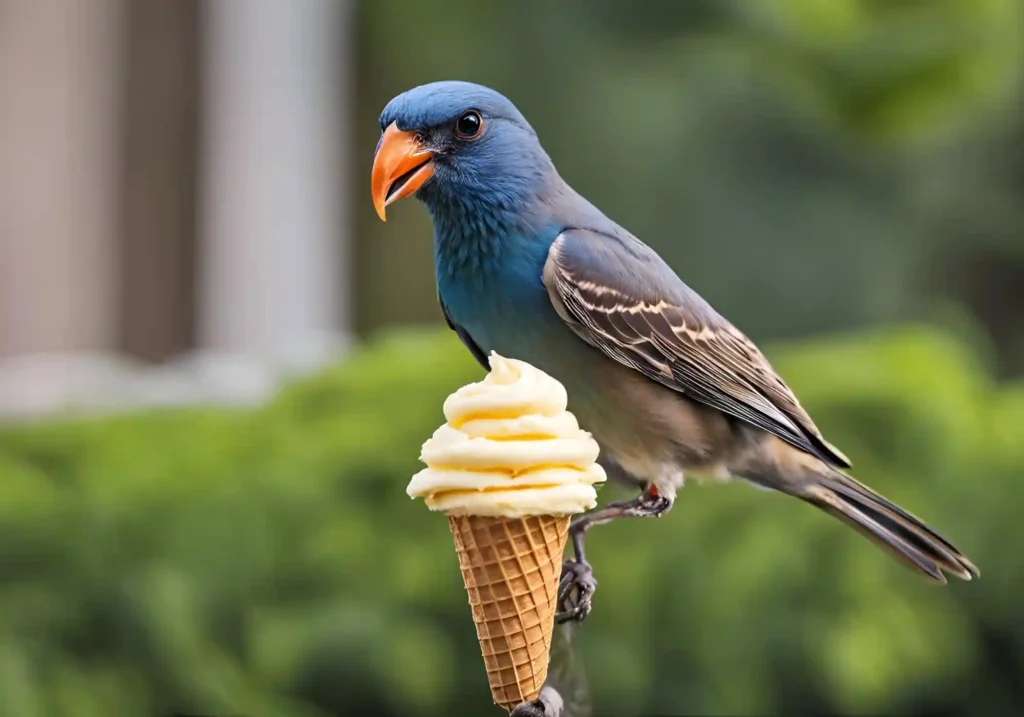Ice cream cones might seem like a fun, crunchy treat, but are they something birds can safely eat? Birds are known to nibble on various foods, but not everything we enjoy is good for them.
If you’ve ever been tempted to share an ice cream cone with a curious bird nearby, it’s worth knowing whether this snack is safe.
Let’s take a closer look at whether ice cream cones are suitable for birds and what you should keep in mind before offering one!
Do Birds Eat Ice Cream Cones?
Yes, birds can eat ice cream cones, but it’s important to be mindful of how you serve them. Ice cream cones are typically made from simple ingredients like flour, sugar, and sometimes eggs, which are not harmful in small amounts.
However, they should be plain and free from any added flavors or toppings that might contain sugar, chocolate, or other ingredients that are not safe for birds.
Birds may enjoy pecking at the crunchy texture of the cone, but it should only be offered as an occasional treat rather than a regular part of their diet.
How to Serve Ice Cream Cones to Birds?
When serving ice cream cones to birds, it’s best to break them into smaller pieces to make it easier for them to eat. You can offer the pieces on a bird feeder or scatter them on the ground where wild birds can easily find them.
Be sure to remove any remnants of ice cream, as the dairy in ice cream is not suitable for birds. By providing plain, broken pieces of ice cream cones, you can allow birds to enjoy a crunchy snack while ensuring their safety and health.
Are Ice Cream Cones Safe for Birds to Consume?
Plain ice cream cones are generally safe for birds to consume, provided they do not contain harmful ingredients like chocolate, nuts, or excessive sugar.
It’s essential to avoid any cones that have added flavors, as these can introduce ingredients that may be harmful to birds.
Always check the ingredients to ensure that there are no additives that could negatively impact a bird’s health. In moderation, plain ice cream cones can be a fun and crunchy treat for birds.
What Ingredients in Ice Cream Cones Could Harm Birds?
Some ingredients found in flavored or processed ice cream cones can be harmful to birds. For instance, cones that contain chocolate, artificial sweeteners, or high levels of sugar can lead to health issues for birds, such as obesity or digestive problems.
It’s crucial to stick with plain, unflavored cones that do not contain any additives. Always read the label carefully and choose cones made from natural ingredients to ensure they are safe for your feathered friends.
Can Birds Eat Plain, Unflavored Ice Cream Cones?

Yes, birds can safely eat plain, unflavored ice cream cones. These cones provide a crunchy texture that many birds enjoy, and they are made from simple ingredients that are not harmful in small amounts.
However, since ice cream cones do not provide significant nutritional value, they should be treated as an occasional treat rather than a staple in a bird’s diet. Offering plain cones in moderation is a fun way to give birds a little variety in their snacks.
Do Birds Enjoy Eating Ice Cream Cones?
Many birds may enjoy eating ice cream cones, especially the crunchy texture they provide. Birds are often attracted to novel food items, and the shape of the cone can be interesting for them.
While some birds might be hesitant at first, once they discover the taste and texture, they are likely to enjoy nibbling on the pieces you offer. It can be a delightful experience for both you and the birds to watch them interact with this unique snack.
Which Bird Species Might Eat Ice Cream Cones?
Various bird species can enjoy ice cream cones, including larger birds like crows, jays, and even some parrots. Smaller birds, like sparrows and finches, may also nibble on the pieces if they are appropriately sized.
The key is to offer the cones in small, manageable pieces so that all species, regardless of size, can enjoy them without any difficulty. Watching different species explore the ice cream cone can be quite entertaining.
Are There Health Risks Associated with Feeding Ice Cream Cones to Birds?
While plain ice cream cones can be safe for birds, there are some health risks to consider. If the cones contain added sugars, flavors, or other harmful ingredients, they can lead to digestive issues or obesity in birds.
Additionally, feeding too many ice cream cones may mean that birds are not getting the balanced nutrition they need from their regular diet. Always offer cones in moderation and ensure they are free from harmful additives.
How Should I Offer Ice Cream Cones to Birds?
To offer ice cream cones to birds, break the cones into small pieces and place them in a bird feeder or scatter them on the ground. This way, both wild and pet birds can easily access the snack.
If you have a bird feeder that allows for treats, you can also secure the cone pieces in the feeder. Make sure to remove any ice cream remnants and ensure the pieces are fresh for the birds to enjoy.
Can My Pet Birds Eat Ice Cream Cones?
Yes, pet birds can eat ice cream cones, but they should be offered in moderation. Always choose plain, unflavored cones and break them into small pieces that are easy for your pet bird to handle.
Monitor how your bird reacts to the cone, and if they seem to enjoy it, you can provide it as an occasional treat. Just be sure that the cones do not become a regular part of their diet, as they do not provide essential nutrients.
Is It Okay to Give Wild Birds Ice Cream Cones?
It is okay to give wild birds ice cream cones, provided they are plain and broken into small pieces. Wild birds can benefit from a variety of food sources, and offering ice cream cones can add some fun to their diet.
However, it’s important to remember that these should only be given occasionally and not as a primary food source, as they lack significant nutritional value.
How Often Can Birds Safely Eat Ice Cream Cones?

Birds should only eat ice cream cones occasionally, perhaps once every few weeks. Since ice cream cones are not highly nutritious, they should not be a regular part of a bird’s diet.
Offering them too frequently can lead to imbalances in their nutrition, so it’s best to treat them as a special snack rather than a staple.
Can Ice Cream Cones Cause Digestive Issues in Birds?
If ice cream cones are served in moderation and are plain, they are unlikely to cause digestive issues in birds. However, if the cones have additives or are consumed in excessive amounts, they could lead to problems like diarrhea or discomfort.
Always monitor how your birds respond to new foods and adjust their diet accordingly to prevent any digestive concerns.
What Should I Consider Before Feeding Ice Cream Cones to Birds?
Before feeding ice cream cones to birds, consider the ingredients carefully. Make sure they are plain and free from harmful additives, such as chocolate or artificial sweeteners.
Additionally, be mindful of the portion size and ensure that the cones do not replace more nutritious foods in their diet.
Observing how your birds react to the cones can also help you determine if they enjoy them and if they are safe for them to eat.
Should Ice Cream Cones Be Given as a Regular Treat or Only Occasionally?
Ice cream cones should only be given to birds occasionally rather than as a regular treat. Since they do not provide significant nutritional benefits, it’s important to ensure that they are part of a balanced diet.
Offering cones as an occasional snack can keep feeding fun and interesting for birds without compromising their health.
How Do You Make Ice Cream Cone Bird Feeders?
To make ice cream cone bird feeders, take plain, unflavored ice cream cones and spread a thin layer of peanut butter on the inside.
Roll the cone in birdseed so that it sticks to the peanut butter. Then, hang the cone from a tree branch or place it in your garden.
This creates an engaging and fun feeder that birds will love to peck at, and it provides them with a delightful treat. Just remember to check the feeders regularly and replace them as needed.






